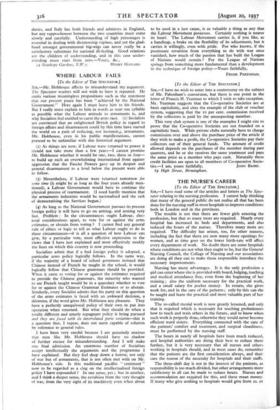WHERE LABOUR FAILS
[To the Editor of THE SPECTATOR.] SIR,-Mr. Hobhouse affects to misunderstand my argument. The Spectator readers will not wish to have it repeated. He emits various meaningless propositions such as the statement that our present peace has been " achieved by the National Government." Here again I must leave him to his friends. But I really must explain to him in words as near one syllable as possible what the Labour attitude to armaments is, and why Socialists feel entitled to curse the arms race. (t) Socialists are convinced that an enlightened British policy in regard to foreign affairs and disarmament could by this time have started the world on a path of reducing, not increasing, armaments. Mr. Hobhouse, even in his public manifestations, cannot pretend to be unfamiliar with this historical argument.
(a) As things are now, if Labour were returned to power it should not take more than a few years—I cannot promise Mr. Hobhouse whether it would be one, two, three or four— to build up such an overwhelming international front against aggression that the Fascist Powers gave up in despair and general disarmament to a level below the present were able to follow.
(3) Nevertheless, if Labour were returned tomorrow for some time (it might be as long as the four years already men- tioned), a Labour Government would have to continue the physical process of rearmament. (I need hardly mention that the armaments industries would be nationalised and the task of democratising the Services begun.)
(4) As long as the National Government pursues its present foreign policy it will have to go on arming, and arming very fast. Problem : In the circumstances ought Labour, elec- toral considerations apart, to vote for or against the arms estimates, or abstain from voting ? I cannot find any general rule of ethics or logic to tell us what Labour ought to do in these circumstances—it is all a question of how Labour can give, by a particular vote, most effective expression to the views that I have just explained and most effectively modify the lines on which this country is now proceeding.
Socialists admit that if a bad foreign policy is adopted, a particular arms policy logically follows. In the same way, if the majority of a board of school governors insisted that Chinese instead of French be taught in the school, it would logically follow that Chinese grammars should be provided. When it came to voting for or against the estimates required to provide the Chinese grammars, the minority who wanted to see French taught would be in a quandary whether to vote for or against the Chinese Grammar Estimates or to abstain. Similarly, every Socialist admits that his party on this question of the arms estimates is faced with an awkward decision, a dilemma, if the word gives Mr. Hobhouse any pleasure. They have a perfectly unequivocal policy of their own to put into operation when returned. But what they should do when a totally different and utterly repugnant policy is being pursued and they are faced with its interrelated parts seriatim—this is a question that, I repeat, does not seem capable of solution by reference to general rules.
I have been very candid because I am genuinely anxious that men like Mr. Hobhouse should have no shadow of further excuse for misunderstanding. And I will make one final admission. An enormous number of Socialists accept intellectually the arguments and the programme I have explained. But they feel deep down a horror, not only of war but of armaments, that is not often met with on Mr. Hobhouse's side. Is this traditional pacifist " sentiment " now to be regarded as a clog on the intellectualised foreign policy I have expounded ? In one sense, yes ; but in another, and I think a deeper sense, the revulsion from the very thought of war, from the very sight of its machinery even when about to be used in a just cause, is as valuable a thing as any that the Laboui Movement possesses. Certainly nothing is nearer its heart.' The Labour Movement carries it, if you like, as a handicap, a brake on the flexibility of its adjustment, but it carries it willingly, even with pride. For who knows, if the passionate revulsion from everything to do with war once vanished, how much of the passion that has built the League of Nations would remain ? For the League of Nations springs from something more fundamental than a development in the technique of foreign policy.—Yours faithfully,
FRANK FAICENHAM.






































 Previous page
Previous page